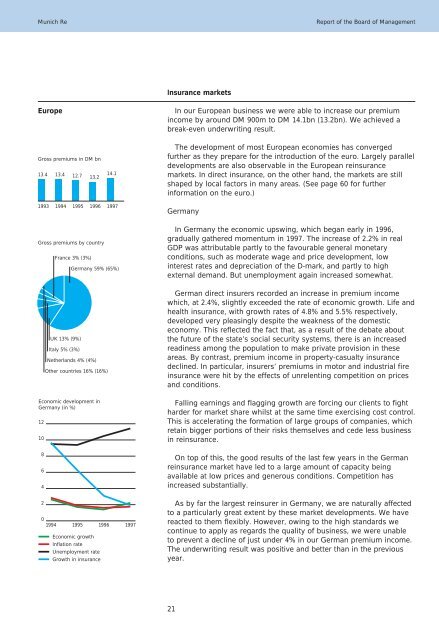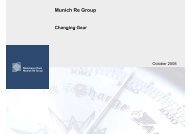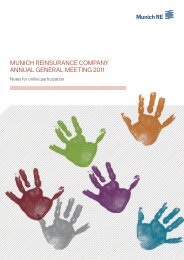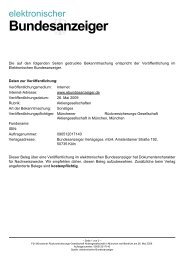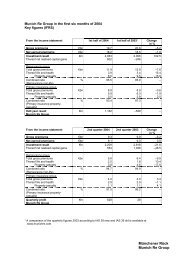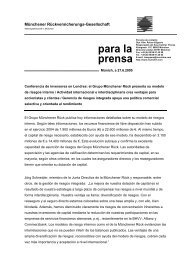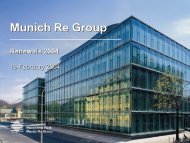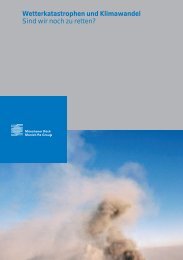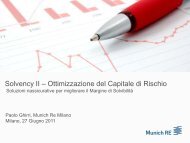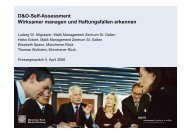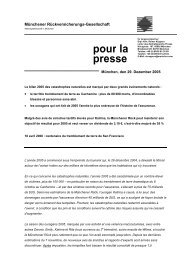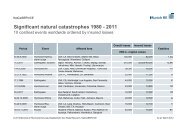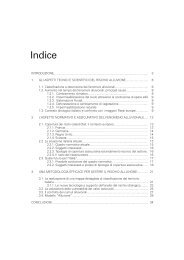Annual Report 1997/1998 - Munich Re
Annual Report 1997/1998 - Munich Re
Annual Report 1997/1998 - Munich Re
Create successful ePaper yourself
Turn your PDF publications into a flip-book with our unique Google optimized e-Paper software.
<strong>Munich</strong> <strong>Re</strong> <strong><strong>Re</strong>port</strong> of the Board of Management<br />
Insurance markets<br />
Europe In our European business we were able to increase our premium<br />
income by around DM 900m to DM 14.1bn (13.2bn). We achieved a<br />
break-even underwriting result.<br />
Gross premiums in DM bn<br />
13.4 13.4<br />
12.7<br />
13.2<br />
1993 1994 1995 1996 <strong>1997</strong><br />
Gross premiums by country<br />
France 3% (3%)<br />
UK 13% (9%)<br />
Italy 5% (3%)<br />
14.1<br />
Germany 59% (65%)<br />
Netherlands 4% (4%)<br />
Other countries 16% (16%)<br />
Economic development in<br />
Germany (in %)<br />
12<br />
10<br />
8<br />
6<br />
4<br />
2<br />
0<br />
1994 1995 1996 <strong>1997</strong><br />
Economic growth<br />
Inflation rate<br />
Unemployment rate<br />
Growth in insurance<br />
The development of most European economies has converged<br />
further as they prepare for the introduction of the euro. Largely parallel<br />
developments are also observable in the European reinsurance<br />
markets. In direct insurance, on the other hand, the markets are still<br />
shaped by local factors in many areas. (See page 60 for further<br />
information on the euro.)<br />
Germany<br />
In Germany the economic upswing, which began early in 1996,<br />
gradually gathered momentum in <strong>1997</strong>. The increase of 2.2% in real<br />
GDP was attributable partly to the favourable general monetary<br />
conditions, such as moderate wage and price development, low<br />
interest rates and depreciation of the D-mark, and partly to high<br />
external demand. But unemployment again increased somewhat.<br />
German direct insurers recorded an increase in premium income<br />
which, at 2.4%, slightly exceeded the rate of economic growth. Life and<br />
health insurance, with growth rates of 4.8% and 5.5% respectively,<br />
developed very pleasingly despite the weakness of the domestic<br />
economy. This reflected the fact that, as a result of the debate about<br />
the future of the state’s social security systems, there is an increased<br />
readiness among the population to make private provision in these<br />
areas. By contrast, premium income in property-casualty insurance<br />
declined. In particular, insurers’ premiums in motor and industrial fire<br />
insurance were hit by the effects of unrelenting competition on prices<br />
and conditions.<br />
Falling earnings and flagging growth are forcing our clients to fight<br />
harder for market share whilst at the same time exercising cost control.<br />
This is accelerating the formation of large groups of companies, which<br />
retain bigger portions of their risks themselves and cede less business<br />
in reinsurance.<br />
On top of this, the good results of the last few years in the German<br />
reinsurance market have led to a large amount of capacity being<br />
available at low prices and generous conditions. Competition has<br />
increased substantially.<br />
As by far the largest reinsurer in Germany, we are naturally affected<br />
to a particularly great extent by these market developments. We have<br />
reacted to them flexibly. However, owing to the high standards we<br />
continue to apply as regards the quality of business, we were unable<br />
to prevent a decline of just under 4% in our German premium income.<br />
The underwriting result was positive and better than in the previous<br />
year.<br />
21


